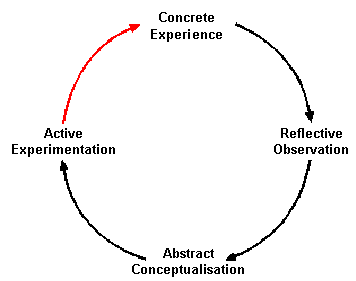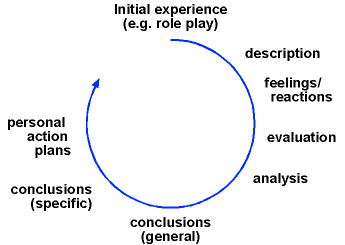The purpose of reflective writing is to help you learn from a particular practical experience. It will help you to make connections between what you are taught in theory and what you need to do in practice. You reflect so that you can learn.
In reflective writing, you are trying to write down some of the thinking that you have been through while carrying out a particular practical activity, such as writing an essay, teaching a class or selling a product. Through reflection, you should be able to make sense of what you did and why and perhaps help yourself to do it better next time.
You might reflect for many reasons in many ways, for example, in a diary or personal log. But here we are interested in the kind of writing that you do for assessment. You are often asked to provide a record of what you did plus a reflection of how you did it and how you are using what you are taught in your classes and any practical experience you are gaining to do this.
Reflective writing gives you the chance think about what you are doing more deeply and to learn from your experience. You have the opportunity to discover how what you are taught in class helps you with your real-world or academic tasks. Writing your thoughts down makes it easier for you to think about them and make connections between what you are thinking, what you are being taught and what you are doing. Your written reflection will also serve as a source of reference and evidence in the future.
It is not sufficient simply to have an experience in order to learn. Without reflecting upon this experience it may quickly be forgotten, or its learning potential lost. It is from the feelings and thoughts emerging from this reflection that generalisations or concepts can be generated. And it is generalisations that allow new situations to be tackled effectively. (Gibbs, 1988, p. 9) |
You might want to or be asked to reflect on:
In your reflection, you could write about:
Reflective writing often involves an action plan in which you should write about:
Kolb's (1984) experiential learning cycle is useful here:

In this case Concrete Experience is the activity - what you did. Reflective Observation is thinking about how you did it, how you felt and how you might have done it differently. Abstract Conceptualisation is thinking about what you were taught in class, what you have read about how to do this stage and why. Active Experimentation is thinking about what you learned from your reflection and conceptualisation and planning how you might do it differently next time.
Let us assume that you are reflecting on something that you have done in class.
You will probably start by describing what you did. You might then want to write about how you did the activity, what methods you used. You might then want to evaluate your performance. How well did you do? In order to do this, you need to consider what you have been taught. You might want to describe what the experts say. You may then to consider your reactions. How did you/do you feel? You might finish by considering how you would do it next time.
In reflective writing it is common to use the first person – ‘I’ - when necessary.
Based on Kolb's work, Gibbs (1988, p. 47) suggests the following stages to encourage deeper reflection:
Description: |
What happened? What are you going to reflect on? Don't make judgements yet or try to draw conclusions. |
Feelings: |
What were your reactions and feelings? |
Evaluation: |
What was good or bad about the experience? Make value judgements. |
Analysis: |
What sense can you make of the situation? Bring in ideas from outside the experience to help you. What was really going on? |
Conclusions (general): |
What can be concluded, in a general sense, from these experiences and the analyses you have undertaken? |
Conclusions (specific): |
What can be concluded about your own specific, unique, personal situation or ways of working? |
Personal action plans: |
What are you going to do differently in this type of situation next time? What steps are you going to take on the basis of what you have learnt? |

based on this pattern, a possible structure of a reflective report is:
Preliminaries |
|
↓ |
|
| Description | Introduction Describe your situation |
Personal report Report what you did and/or what happened. |
|
↓ |
|
| Feelings | Personal report Report how you felt. |
↓ |
|
| Evaluation | Reflection on action Report what was good/bad, easy/difficult, pleasant/unpleasant etc Compare and contrast your experiences Explain why |
↓ |
|
| Analysis | Reflection on teaching Report what have you been taught Describe what you know |
↓ |
|
Connections Evaluate your practice, drawing on your knowledge & experience |
|
↓ |
|
| Conclusions | Identify gaps Describe any gaps in your knowledge Explain how you can fill them Generalise to the future |
↓ |
|
| Action | Action plan Produce action plan for future (learning + practice) Justify your action plan |
↓ |
|
End matter |
See: Rhetorical functions in academic writing: Reflecting for more examples and language.